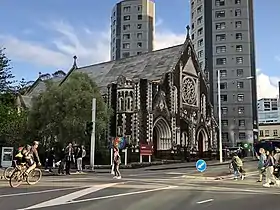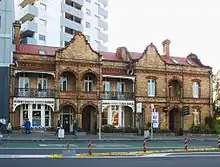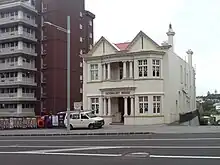Symonds Street
Symonds Street is a street in Auckland, New Zealand's most populous city. The road runs southwest and uphill from the top of Anzac Avenue (originally Jermyn Street), through the City Campus of University of Auckland, over the Northwestern Motorway and Auckland Southern Motorway and to the start of New North Road and Mount Eden Road.
 St Paul's Church and residential apartments on Symonds Street | |
| Length | 2.0 km (1.2 mi) |
|---|---|
| Location | Auckland CBD, New Zealand |
| Postal code | 1010 |
| North end | Anzac Avenue, Waterloo Quadrant |
| South end | Mount Eden Road, New North Road |
History
The route of Symonds Street originated as a Tāmaki Māori overland walking track,[1] linking the Horotiu valley (modern-day Auckland CBD) and the Waitematā Harbour with other populated areas of the Tāmaki isthmus to the south.
During the early colonial era of Auckland, it was the main south-bound road. It was named after William Cornwallis Symonds in 1842, soon after his death.[2]
Demographics
The statistical areas of Symonds Street North West, Symonds Street West and Symonds Street East encompass the area east of Queen Street and west of Grafton Gully. They do not include the part of Symonds Street which runs through the University of Auckland, or the part south of SH 1. They cover 0.34 km2 (0.13 sq mi)[3] and had an estimated population of 9,250 as of June 2023,[4] with a population density of 27,206 people per km2.
| Year | Pop. | ±% p.a. |
|---|---|---|
| 2006 | 4,701 | — |
| 2013 | 7,149 | +6.17% |
| 2018 | 7,758 | +1.65% |
| Source: [5] | ||
Symonds Street had a population of 7,758 at the 2018 New Zealand census, an increase of 609 people (8.5%) since the 2013 census, and an increase of 3,057 people (65.0%) since the 2006 census. There were 3,147 households, comprising 3,876 males and 3,876 females, giving a sex ratio of 1.0 males per female, with 213 people (2.7%) aged under 15 years, 5,304 (68.4%) aged 15 to 29, 2,109 (27.2%) aged 30 to 64, and 135 (1.7%) aged 65 or older.
Ethnicities were 26.9% European/Pākehā, 4.4% Māori, 3.0% Pacific peoples, 63.1% Asian, and 8.4% other ethnicities. People may identify with more than one ethnicity.
The percentage of people born overseas was 77.2, compared with 27.1% nationally.
Although some people chose not to answer the census's question about religious affiliation, 53.0% had no religion, 22.1% were Christian, 0.1% had Māori religious beliefs, 7.1% were Hindu, 7.3% were Muslim, 4.6% were Buddhist and 2.6% had other religions.
Of those at least 15 years old, 2,643 (35.0%) people had a bachelor's or higher degree, and 273 (3.6%) people had no formal qualifications. 471 people (6.2%) earned over $70,000 compared to 17.2% nationally. The employment status of those at least 15 was that 2,484 (32.9%) people were employed full-time, 1,530 (20.3%) were part-time, and 603 (8.0%) were unemployed.[5]
| Name | Area (km2) | Population | Density (per km2) | Households | Median age | Median income |
|---|---|---|---|---|---|---|
| Symonds Street North West | 0.09 | 2,922 | 32,467 | 1,407 | 24.7 years | $12,500[6] |
| Symonds Street West | 0.15 | 2,856 | 19,040 | 1,209 | 26.6 years | $15,100[7] |
| Symonds Street East | 0.10 | 1,980 | 19,800 | 531 | 23.5 years | $9,200[8] |
| New Zealand | 37.4 years | $31,800 |
Notable locations


- St Andrew's First Presbyterian Church, 2 Symonds St, 1850, oldest surviving church in Auckland.[9]
- Belgrave, 12 Symonds St, 1885, Two-storey Italianate house, now part of the University of Auckland.[10]
- House, 14 Symonds St, 1884, Two-storey Italianate house, now part of the University of Auckland.[11]
- House, 16 Symonds St, 1884, Two-storey Italianate house, now part of the University of Auckland.[12]
- Old Choral Hall, 5-7 Symonds St, 1872, A concert chamber and public hall, now part of the University of Auckland.[13]
- St Paul's Church, 28 Symonds St, 1895, Anglican church built on the site of the first church in Auckland.[14]
- Terrace Houses, 25-29 Symonds St, c.1897, private dwelling built by John Endean.[15]
- Aickin House, 39 Symonds St, 1920s neo-Georgian house.[16]
- New Zealand Wars memorial, corner Symonds St and Wakefield St, 1920, memorial to those who fought on the British side in the 19th century wars.[17]
- Cintra Flats, 9-13 Whitaker Place, 1936, apartment complex.[18]
- Rationalist House, 64 Symonds St, purchased in 1960 by the Rationalist Association as a base and library.[19]
- Doctors Residences, 84-86 Symonds St, 1935-1937, residences of two doctors designed by the same architect.[20]
- Plummer House, 5 City Road, 1909, residence of hat manufacturer and musician Charles Plummer.[21]
- Bus Shelter and Toilets, corner Symonds St and Grafton Bridge, 1910, bus shelter and public toilets.[22]
- Symonds Street Cemetery, 120 Symonds St, 1841, one of Auckland's oldest cemeteries.[23]
- Grafton Bridge, 1910, largest single-span of reinforced concrete in the world at the time of construction.[24]
- St Benedict's Church, 1 St Benedicts St, 1888, Gothic church building, possibly the largest in New Zealand at the time of construction.[25]
- Stables, 32 St Benedicts St, 1883, originally part of a larger complex hosting at least 30 Clydesdale horses.[26]
- Upper Symonds Street Historic Area, an area covering Symonds Street south of the Southern Motorway, and adjacent parts of Kyhber Pass Road, Newton Road, Mt Eden Road and New North Road.[27]
References
- Mackintosh, Lucy (2021). Shifting Grounds: Deep Histories of Tāmaki Makaurau Auckland. Bridget Williams Books. p. 68. doi:10.7810/9781988587332. ISBN 978-1-988587-33-2.
- "Symonds Street Cemetery". Karangahape Road Business Association. Retrieved 1 August 2020.
- "ArcGIS Web Application". statsnz.maps.arcgis.com. Retrieved 12 July 2022.
- "Population estimate tables - NZ.Stat". Statistics New Zealand. Retrieved 25 October 2023.
- "Statistical area 1 dataset for 2018 Census". Statistics New Zealand. March 2020. Symonds Street North West (135100), Symonds Street West (135300) and Symonds Street East (135900).
- 2018 Census place summary: Symonds Street North West
- 2018 Census place summary: Symonds Street West
- 2018 Census place summary: Symonds Street East
- "St Andrew's Church (Presbyterian)". New Zealand Heritage List/Rārangi Kōrero. Heritage New Zealand. Retrieved 1 August 2020.
- "Belgrave". New Zealand Heritage List/Rārangi Kōrero. Heritage New Zealand. Retrieved 1 August 2020.
- "House (former)". New Zealand Heritage List/Rārangi Kōrero. Heritage New Zealand. Retrieved 1 August 2020.
- "House (former)". New Zealand Heritage List/Rārangi Kōrero. Heritage New Zealand. Retrieved 1 August 2020.
- "Old Choral Hall, University of Auckland". New Zealand Heritage List/Rārangi Kōrero. Heritage New Zealand. Retrieved 1 August 2020.
- "St Paul's Church (Anglican)". New Zealand Heritage List/Rārangi Kōrero. Heritage New Zealand. Retrieved 1 August 2020.
- "Terrace Houses". New Zealand Heritage List/Rārangi Kōrero. Heritage New Zealand. Retrieved 1 August 2020.
- "Aickin House". New Zealand Heritage List/Rārangi Kōrero. Heritage New Zealand. Retrieved 1 August 2020.
- "New Zealand Wars Memorial". New Zealand Heritage List/Rārangi Kōrero. Heritage New Zealand. Retrieved 1 August 2020.
- "Cintra Flats". New Zealand Heritage List/Rārangi Kōrero. Heritage New Zealand. Retrieved 1 August 2020.
- Walrond, Carl (4 April 2018). "Atheism and secularism - Organised secular groups - Rationalist House, Auckland". Te Ara - Encyclopedia of New Zealand.
- "Doctors' Residences (Former)". New Zealand Heritage List/Rārangi Kōrero. Heritage New Zealand. Retrieved 1 August 2020.
- "Plummer House (Former)". New Zealand Heritage List/Rārangi Kōrero. Heritage New Zealand. Retrieved 1 August 2020.
- "Bus Shelter and Toilets". New Zealand Heritage List/Rārangi Kōrero. Heritage New Zealand. Retrieved 1 August 2020.
- "Symonds Street Cemetery". New Zealand Heritage List/Rārangi Kōrero. Heritage New Zealand. Retrieved 1 August 2020.
- "Grafton Bridge". New Zealand Heritage List/Rārangi Kōrero. Heritage New Zealand. Retrieved 1 August 2020.
- "St Benedict's Church and Presbytery Complex (Catholic)". New Zealand Heritage List/Rārangi Kōrero. Heritage New Zealand. Retrieved 1 August 2020.
- "Stables (Former)". New Zealand Heritage List/Rārangi Kōrero. Heritage New Zealand. Retrieved 1 August 2020.
- "Upper Symonds Street Historic Area". New Zealand Heritage List/Rārangi Kōrero. Heritage New Zealand.